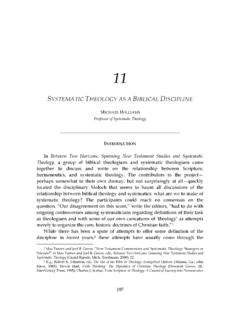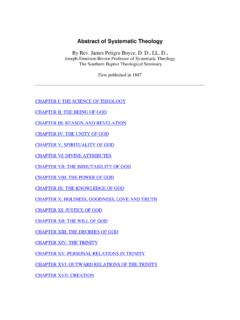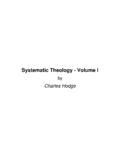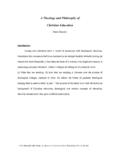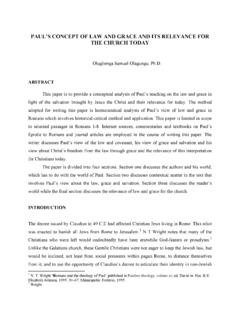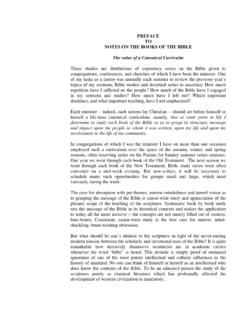Transcription of “What Is Theology of Mission” - …
1 Teolog a y cultura, a o 1, vol. 1 (agosto 2004) what Is Theology of mission Charles E. Van Engen Keywords: mission , Bible, Community, Context 1 In The Concise Dictionary of the Christian mission , Gerald Anderson defined Theology of mission as, concerned with the basic presuppositions and underlying principles which determine, from the standpoint of Christian faith, the motives, methods, strategy and goals of the Christian world mission (Neil, Anderson and Goodwin, edits: 1971:594). Theology of mission is a multi- and inter-disciplinary enterprise. It is a relatively new discipline, with its first text appearing in 1961, in a collection of essays edited by Gerald Anderson, entitled, The Theology of Christian mission (Anderson: 1961).
2 In that volume the tri-partite nature of Theology of mission was clearly represented. A. Biblical Text Inte grating Theme C. Missional Context B. Faith Community Figure 1. T he Tripartite Nature of Theology of mission As shown in Figure 1, the Theology of mission has to do with three areas, shown graphically by three inter-locking circles. Biblical and Theology presuppositions and values (A); are applied to the enterprise of the ministry and mission of the church (B); and are in the context of specific activities carried out in particular times and places (C).2 1 The following is taken from a larger chapter on Constructing Theology of mission for the City, in Charles Van Engen and Jude Tiersma, edits.
3 God So Loves the City. Seeking a Theology for Urban mission . Monrovia: MARC, 1994. 2 The three-arena nature of this method is not original with me. A number of others have highlighted something similar, particularly those who deal with contextualization from a missiological perspective. See, Teolog a y cultura, 1 (agosto 2004) 46 Theology of mission is Theology (circle A in the diagram), because fundamentally it involves reflection about God. It seeks to understand God s mission , God s intentions and purposes, God s use of human instruments in God s mission , and God s working through God s People in God s Thus Theology of mission deals with all the traditional theological themes of systematic Theology but it does so in a way that differs from how systematic theologians have worked down through the centuries.
4 The difference arises from the multi-disciplinary missiological orientation of its theologizing. In addition, because of its commitment to remain faithful to God s intentions, perspectives, and purposes, Theology of mission shows a most fundamental concern over the relation of the Bible to mission , attempting to allow Scripture not only to provide the foundational motivations for mission , but also to question, shape, guide, and evaluate the missionary Theology of mission is Theology OF (circle C in the diagram). In contrast to much systematic Theology , here we are dealing with an applied Theology .
5 At times it looks like what some would call pastoral or practical Theology , due to this applicational nature. This type of theological reflection focuses specifically on a set of particular issues those having to do with the mission of the Church in its CONTEXT. Theology of mission draws its incarnational nature from the ministry of Jesus, and always happens in a specific time and place. Thus circle C involves the missiological use of all the social science disciplines that help us understand the context in which God s mission takes place. We begin by borrowing from sociology, anthropology, economics, urbanology, the study of the relation of Christian churches to other religions, psychological issues, the study of the relation of Church and state, and a host of other cognate disciplines to understand the specific context in which we are doing our Theology of mission reflection.
6 Such contextual analysis moves us, secondly, to more particular understanding of the context in terms of a hermeneutic of the reality in which we are ministering. This in turn, thirdly, calls us to hear for example, Eugne Nida: 1960; Louis Luzbetak, 1963; Jos M guez-Bonino, 1975; Shoki Coe, 1976; Harvie Conn, 1978, 1984, 1993a, 1993b; Arthur Glasser, 1979; Charles Kraft, 1979, 1983; Charles Kraft and Tom Wisely, edits.: 1979; Bruce Fleming, 1980; Stott & Coote: 1980; Harvie Conn: 1984; Paul Hiebert: 1978, 1987, 1993; Robert Schrieter: 1985; C.
7 Ren Padilla and Mark Lau Branson: 1986; Alan R. Tippett: 1987; Daniel Shaw: 1988; Dean Gilliland, edit: 1989; David Hesselgrave: 1989; Lamin Sanneh: 1989; Charles Van Engen: 1989; William Dyrness: 1990; Stephen Bevans: 1992; and Donald R. Jacobs, 1993. 3 See, for example, Daniel T. Niles: 1962; Georg F. Vicedom: 1965; John V. Taylor: 1972; Johannes Verkuyl: 1978, 163-204; and John Stott: 1979. 4 See, , Robert Glover: 1946; G. Ernest Wright: 1952; J. H. Bavinck: 1960: Gerald Anderson: 1961 in loco; Harry Boer: 1961; Johannes Blauw: 1962; Roland Allen: 1962; Richard De Ridder: 1971; George Peters: 1972; Orlando Costas: 1974, 1982, 1989; John Stott: 1976; Lesslie Newbigin: 1978; J.
8 Verkuyl: 1978, chapter IV; David Bosch: 1978, 1991, 1993; Dean Gilliland: 1983; Gailyn Van Rheenen: 1983; William A. Dyrness: 1983; Donald Senior and Carroll Stuhlmueller: 1983; Roger Hedlund: 1985; Marc Spindler: 1988; Ken Gnanakan: 1989; Arthur Glasser: 1992; and Charles Van Engen: 1992, 1993. A combined bibliography drawn from these works would offer an excellent resource for examining the relation of Bible and mission . C. van Engen, what is Theology of mission 47 the cries, see the faces, understand the stories, and respond to the living needs and hopes of the persons who are an integral part of that context.
9 A part of this contextual analysis today includes the history of the way the church in its mission has interfaced with that context down through history. The attitudes, actions, and events of the Church s mission that occurred in your context prior to your particular reflection will colour in profound and surprising ways the present and the future of your own missional endeavors. Thus you will find some scholars dealing with the history of Theology of mission5 who, although they are not especially interested in the theological issues as such, are concerned about the effects of that mission Theology upon mission activity in that context.
10 They will often examine the various pronouncements made by church and mission gatherings (Roman Catholic, Orthodox, Ecumenical, Evangelical, Pentecostal, and Charismatic) and ask questions, sometimes polemically, about the results of these for missional The documents resulting from these discussions become part of the discipline of Theology of mission . Thirdly, Theology of mission is specially oriented toward and for mission (circle B in Figure 1). The most basic reflection in this arena is found in the many books, journals, and other publications dealing with the theory of missiology However, neither missiology nor Theology of mission can be allowed to restrict itself to reflection only.

